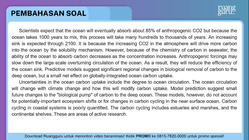Iklan
Iklan
Pertanyaan
Scientists expect that the ocean will eventually absorb about 85% of anthropogenic CO2 but because the ocean takes 1000 years to mix, this process will take many hundreds to thousands of years. An increasing sink is expected through 2100. It is because the increasing CO2 in the atmosphere will drive more carbon into the ocean by the solubility mechanism. However, because of the chemistry of carbon in seawater, the ability of the ocean to absorb carbon decreases as the concentration increases. Anthropogenic forcings may slow down the large-scale overturning circulation of the ocean. As a result, they will reduce the efficiency of the ocean sink. Predictive models suggest significant regional changes in biological removal of carbon to the deep ocean, but a small net effect on globally-integrated ocean carbon uptake.
Uncertainties in the ocean carbon uptake include the degree to ocean circulation. The ocean circulation will change with climate change and how this will modify carbon uptake. Model prediction suggest small future changes to the "biological pump" of carbon to the deep ocean. These models, however, do not account for potentially-important ecosystem shifts or for changes in carbon cycling in the near-surface ocean. Carbon cycling in coastal systems is poorly quantified. The carbon cycling includes estuaries and marshes, and the continental shelves. These are areas of active research.
There are additional consequences to the ocean's uptake of carbon. CO2 dissolves in seawater and forms carbonic acid. It eventually makes the ocean more acidic. From preindustrial times to present the pHof the ocean has declined 0,1 pH units, from 8.21 to 8.10, and it is likely to decline by another 0,-0,4 pH units by the 2100, assuming atmospheric CO2 is about 800 ppmv by that time. Acidification will damage coral reefs. It likely places significant stress on species important to ocean food chain, as well, particularly in the Southern Ocean. Scientists are working hard to better-understand the impacts on organisms and the integrated effects on ocean ecosystems.
What can be inferred from the passage? (SOAL SBMPTN REFERENSI 2021)
What can be inferred from the passage?
(SOAL SBMPTN REFERENSI 2021)
Ocean circulation impacts marine lives
Most of the carbon in the air will be absorbed by the ocean
Coastal carbon measurement methods need improvement
Carbon absorbed will be deposited in the seabed securely
More scientists are required to measure the impacts of carbon absorption
Iklan
N. Puspita
Master Teacher
13
0.0 (0 rating)
Iklan
Iklan
Pertanyaan serupa
RUANGGURU HQ
Jl. Dr. Saharjo No.161, Manggarai Selatan, Tebet, Kota Jakarta Selatan, Daerah Khusus Ibukota Jakarta 12860
Produk Ruangguru
Bantuan & Panduan
Hubungi Kami
©2024 Ruangguru. All Rights Reserved PT. Ruang Raya Indonesia
















